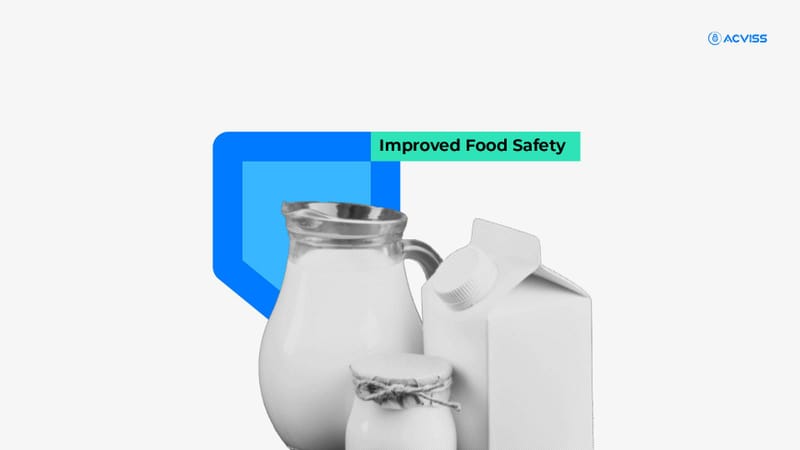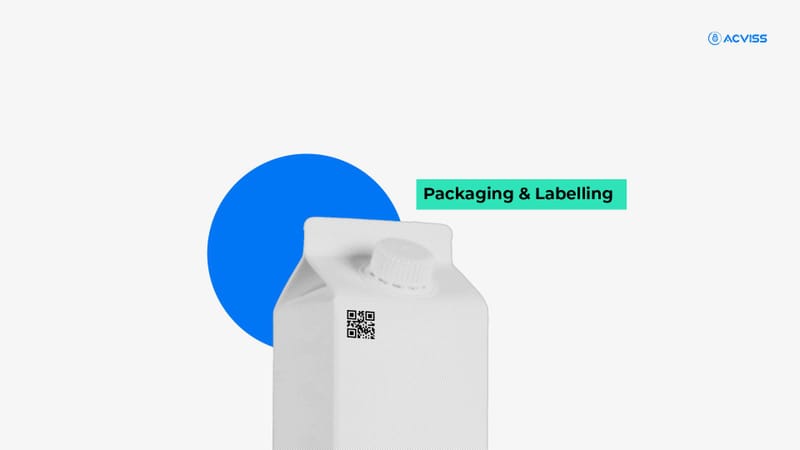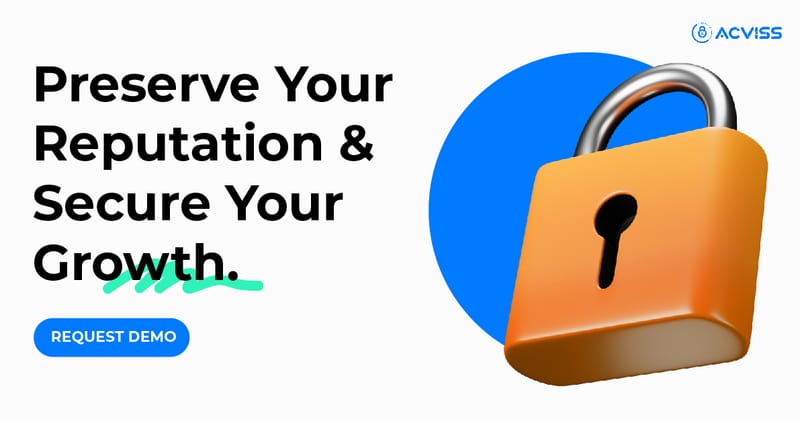Securing the Dairy Supply Chain: The Impact of Traceability Solutions

The dairy industry is transforming with the increasing importance of traceable and sustainable supply chains. For dairy firms to survive and thrive in the market, they need to provide high-quality, safe, and sustainable dairy products.
Nielsen’s report says that about 73% of consumers globally prefer buying from organizations that provide clear information about how they procured and produced their products. So, as consumers demand transparency and accountability in the dairy products they consume, the dairy industry’s focus on supply chain traceability has grown significantly. The ability to track each step of the dairy supply chain, from the farms to the retail shelves, ensures product integrity, supports environment-protecting sustainable practices, and bolsters consumer trust.
So, let’s delve deep to discover the dairy industry's approach to supply tracking and enhancing transparency.
What’s Meant by Traceability and Sustainability in the Dairy Supply Chain?

With consumers demanding transparency, environmental responsibility, and ethical production practices, especially in the food sector, product traceability and sustainability have become crucial aspects of the dairy supply chain.
So, what’s meant by traceability and sustainability?
Traceability in the dairy supply chain refers to tracking the journey of dairy products, including milk, cheese, butter, and yoghurt, from the farm to the end consumers. It’s about monitoring the stages of procurement, processing, production, and distribution to pinpoint potential defects, authenticity issues, or safety hazards and resolve them.
Conversely, sustainability is all about adopting practices that promote the long shelf life of dairy products while minimizing negative environmental impacts.
Traceability and sustainability are closely related. By monitoring every stage of the supply chain, companies can identify inefficiencies and make improvements, thereby reducing waste.
Supply Chain Challenges in Dairy Industry
The dairy supply chain faces many complexities and challenges that could impact its efficiency, resilience, or sustainability. Some of these are:
- Farmers, especially small-scale ones, can struggle to collect accurate data on milk production, livestock health, or environmental conditions.
- Multiple stakeholders are involved in dairy production, from small-scale farmers to large-scale distributors. To maintain product integrity, companies must communicate and collaborate seamlessly with each player. The lack of standardized processes across various stakeholders often leads to inconsistencies and inefficiencies.
- The dairy supply chain can be potentially disrupted by several factors, such as disease outbreaks, labour shortages, natural calamities, or transportation issues. These can cause delays in the flow of milk from farms to processing units and retail outlets, resulting in supply shortages.
- Dairy supply chains are subject to rigorous industry and environmental regulatory guidelines, including quality controls, safety inspections, and reducing carbon emissions. Navigating all these regulations can be challenging, especially when different countries impose different standards.
- Animal welfare is another major concern. Dairy firms must comply with animal welfare standards throughout the supply chain to meet ethical expectations and maintain consumer trust.
- The dairy industry faces a growing demand for organic, grass-fed, and non-GMO products, adding another layer of complexity to supply chain management. These products require specialized handling, further emphasizing the need for a robust traceability system to track every supply chain aspect.
What are the Benefits of Dairy Supply Chain Traceability?
Embracing efficient product traceability and sustainability in the dairy supply chain can offer the following perks:
- Improved Food Safety: The first key benefit of supply chain traceability is ensuring food safety. Monitoring each supply chain stage can help identify the potential contamination source, allowing prompt corrective actions and preventing the delivery of harmful products.

- Compliance with Regulations: Tracking and tracing the supply chain will ensure your dairy company’s compliance with stringent food safety and quality regulations. You can seamlessly meet international standards, reducing the risk of penalties and ensuring smooth operations even in the global markets.
- Enhanced Consumer Trust: Tracing the supply chain is the best recourse to meet consumers’ demands for enhancing transparencyand accountability. Detailed information about each supply chain stage will let your customers know how the product was produced, processed, and transported, reassuring them that the food is safe and ethically sourced.
- Optimizing Supply Chain Efficiency: Traceability provides detailed insights into each step of the supply chain, enabling your firm to pinpoint inefficiencies and areas for improvement and, thus, optimize key processes. Whether reducing transportation times or ensuring that products are processed promptly, traceability can help streamline all these operations.
- Sustainability Goals: Through enhanced traceability, you can monitor how your supply chain impacts the environment and work toward more sustainable practices. Your business can quickly track energy use, carbon emissions, and waste production, helping it adopt more eco-friendly operations.
Case Study
In 2018, the national milk marketing cooperative in the US, the Dairy Farmers of America (DFA), deployed a test program to explore blockchain for agriculture and food. It partnered with the startup Ripe.io for food traceability.
The company encountered consumers’ demand to know where dairy and food products come from. Blockchain technology like Ripe.io helped the firm improve its supply chain traceability and provide consumers with real-time data about production from start to finish, which increased their trust and confidence.
Also Read Top Cases of Food Safety Violations in 2024
Dairy Supply Chain Traceability Process in India
India, among the largest producers of milk in the world, has a complex and dynamic dairy supply chain, with millions of small-scale farmers contributing to production. Usually, Indian dairy companies follow the below-explained dairy supply chain traceability process to enhance transparency and accountability:
1. Farm Management
In India, dairy production often begins at the village level, where small-scale farmers provide milk to collection centres. These centres test the milk for quality, such as fat content and contamination. They also record information about the health and treatment of dairy animals and feed sources.
2. Processing & Manufacturing
Once the milk reaches processing plants, these units monitor temperature control and hygiene practices to maintain the milk’s safety and freshness. Moreover, records about milk intake, processing methods, and product formulation are maintained to eliminate quality concerns.
3. Packaging & Labelling

After processing, milk and other dairy products are packaged for distribution. Digital transformation now allows companies to label the packaging of dairy products with unique QR codes and digital labels to trace the products’ origin, processing details, expiration dates, or specifications with a simple scan.
For instance, you can use Acviss’s Uniqolabel to incorporate tamper-proof, holographic labels into your products’ packaging for a unique, verifiable identity.
4. Distribution & Logistics
Distributors and retailers track the movement of their dairy goods from manufacturing units to retail outlets by maintaining records of storage conditions, transportation, and handling practices.
Many companies have now started using tracking and traceability solutions like Acviss’s Origin that leverage blockchain technology to enhance transparency in this final stage of the supply chain.
A Necessity
The rise of milk contamination and adulteration, improper handling practices, fraud incidents, and environmental impacts have necessitated the implementation of product traceability and sustainability solutions in the dairy industry. Leveraging tools like Origin by Acviss can enhance the traceability of the dairy supply chain and contribute to more sustainable dairy production.
If you are interested in enhancing the transparency of your dairy supply chain, contact Get in touch with us. Our advanced supply chain traceability solutions can help.
